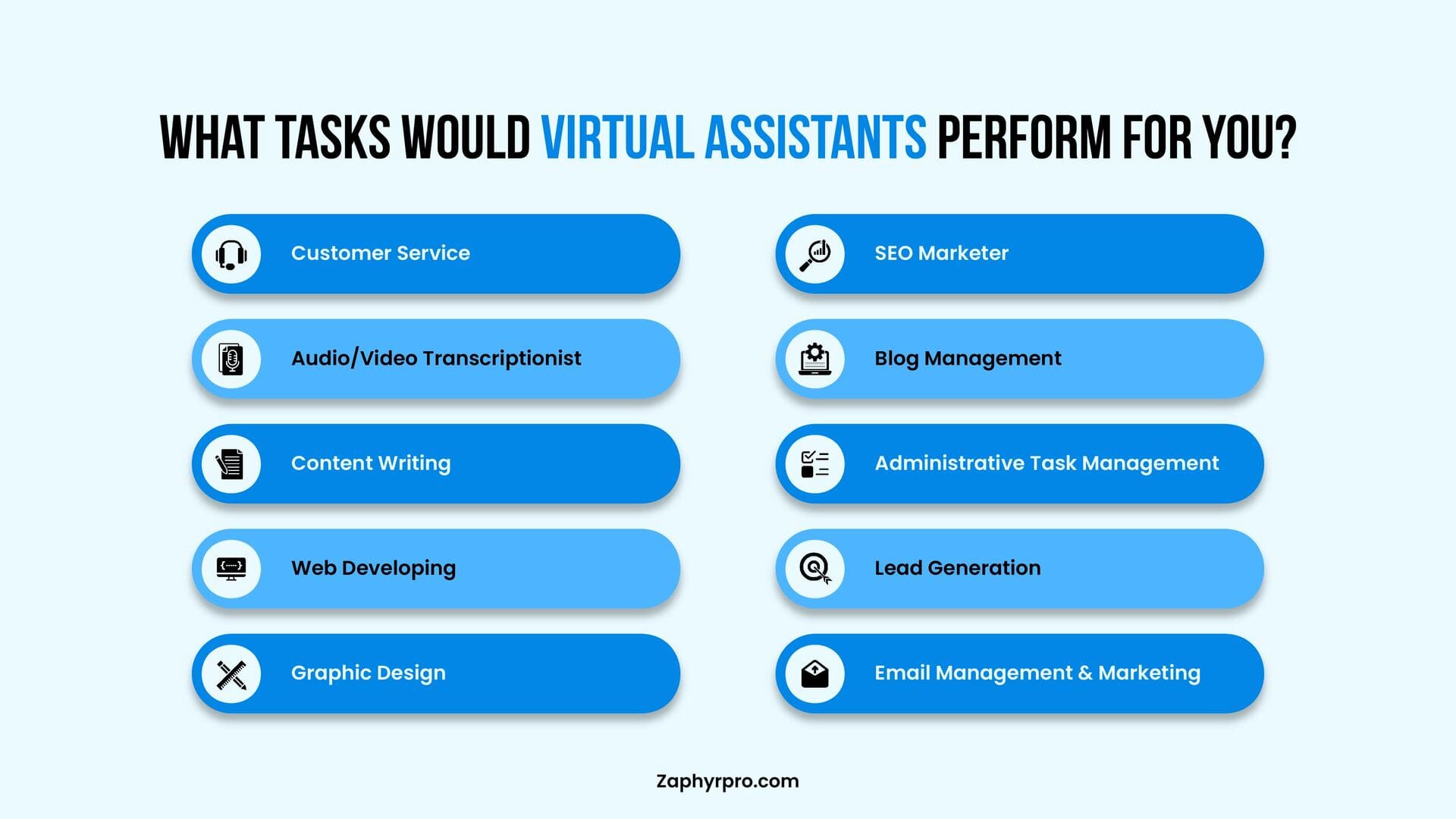“Time is money,” said Benjamin Franklin.
Clearly, Ben never spent three hours updating a CRM system or chasing prospects who went ghost after saying they were “very interested.”
If Franklin ran a sales team today, he’d probably update his famous quote to: “Time is admin work, and admin work is the enemy of commissions.”
And isn’t that what most sales teams deal with today?
Hours disappear into spreadsheets. Endless reminders. Prospect lists that never stop growing.
All important? Yes.
But none of it brings in REVENUE.
Which is why many companies now rely on a virtual sales assistant.
The work still has to be done, but it does not have to be done by your salespeople.
Specifically, a virtual sales assistant is a remote worker who handles sales lead generation, CRM management, and client follow-ups at a lower cost than in-house staff.
You can hire a virtual sales assistant in many ways, onshore or offshore. This guide will explain what they do, why they’re important in 2025, and how to choose the right fit for your business.
What Is a Virtual Sales Assistant?
I remember when Tim Ferriss published The 4-Hour Work Week in 2009. That book introduced many of us to outsourcing. The idea was simple. Hand off repetitive work to someone offshore at a lower cost and use that time for bigger priorities.
Since then, virtual sales representatives have become common. You can find freelancers, agencies, offshore providers, and local specialists offering support. The hard part today isn’t deciding if they help. It’s figuring out which kind of help you actually need.
To put that in perspective:
A sales virtual assistant is not the same as a general VA. They aren’t there to book travel one day and post on social media the next. Their job is focused on sales. They research leads, update the CRM, keep the pipeline current, and follow up with prospects. While they take care of these jobs, your reps can spend their time selling.
So, is virtual assistant still in demand?
Absolutely.
According to The Business Research Company, the global virtual assistant market is expected to grow from $4.97 billion in 2023 to $6.37 billion in 2024, and is projected to reach $15.88 billion by 2028, with a CAGR of 25.7%.
That kind of growth tells you one thing that the need for skilled, flexible sales support isn’t slowing down any time soon.
What does a virtual sales assistant do?
A virtual sales assistant supports your sales team by handling non-selling tasks like:
- Researching and qualifying leads
- Updating and maintaining your CRM
- Managing follow-up emails and call schedules
- Organizing sales pipeline data
- Creating reports and tracking performance metrics
- Booking meetings and sending reminders
Now, you might be thinking this sounds similar to what an executive assistant does – and you’re not wrong. There’s definitely some overlap in the organizational and administrative skills.
But here’s the key difference:
While an executive assistant focuses on personal scheduling, travel arrangements, and general administrative support for executives, a virtual sales assistant lives and breathes your sales process.
They understand B2B market research, lead qualification criteria, know how to nurture prospects through your sales funnel, and can spot when a deal is going cold. It’s the difference between someone who can schedule a meeting and someone who knows which meetings are worth your time.
If you’re considering an executive assistant instead and want to explore that route thoroughly, you might find it helpful to learn about the top executive assistant interview questions to ensure you’re asking the right questions during your hiring process.
But for most growing businesses focused on revenue growth, a virtual sales assistant’s specialized sales focus delivers better results than general administrative support.
There are also different types of virtual sales assistants.
- Outbound assistants handle sales prospecting, list building, and cold outreach. For example, if you’re running a campaign to reach new accounts, they can research the decision-makers and prepare the first touchpoints.
- Inbound assistants qualify incoming leads, clean up the CRM, and make sure every contact is followed up with. If someone downloads a guide from your site, they’ll log it and schedule the next step for your sales team.
- Hybrid assistants do a mix of both. Smaller teams often choose this type because it gives flexibility as needs change.
Scale Smarter with Dedicated Virtual Staff
Delegate the busywork so your salespeople can spend more time closing deals.
Why Should You Consider Hiring a Virtual Assistant for Sales?
You need a virtual sales assistant if you’re missing sales opportunities because your team can’t respond to leads fast enough or handle the growing volume of prospects. Many business owners try to manage everything themselves, thinking they’re saving money.
Eventually (as your sales volume grows), you reach a point where your revenue stalls because you can’t keep up with all the leads, calls, and paperwork that come with a growing sales pipeline.
Signs You Need a Virtual Sales Assistant
- Leads go cold before you contact them
- You’re working evenings just to catch up on follow-ups
- Customers complain about slow response times
- You’re not calling back prospects fast enough
- Your sales data is scattered across different tools
- You’re missing important sales meetings
- Qualified leads slip through the cracks
When you reach the stage where you’re too busy to follow up with hot leads, you’re leaving money on the table. And that means it might be time to hire a virtual sales rep.
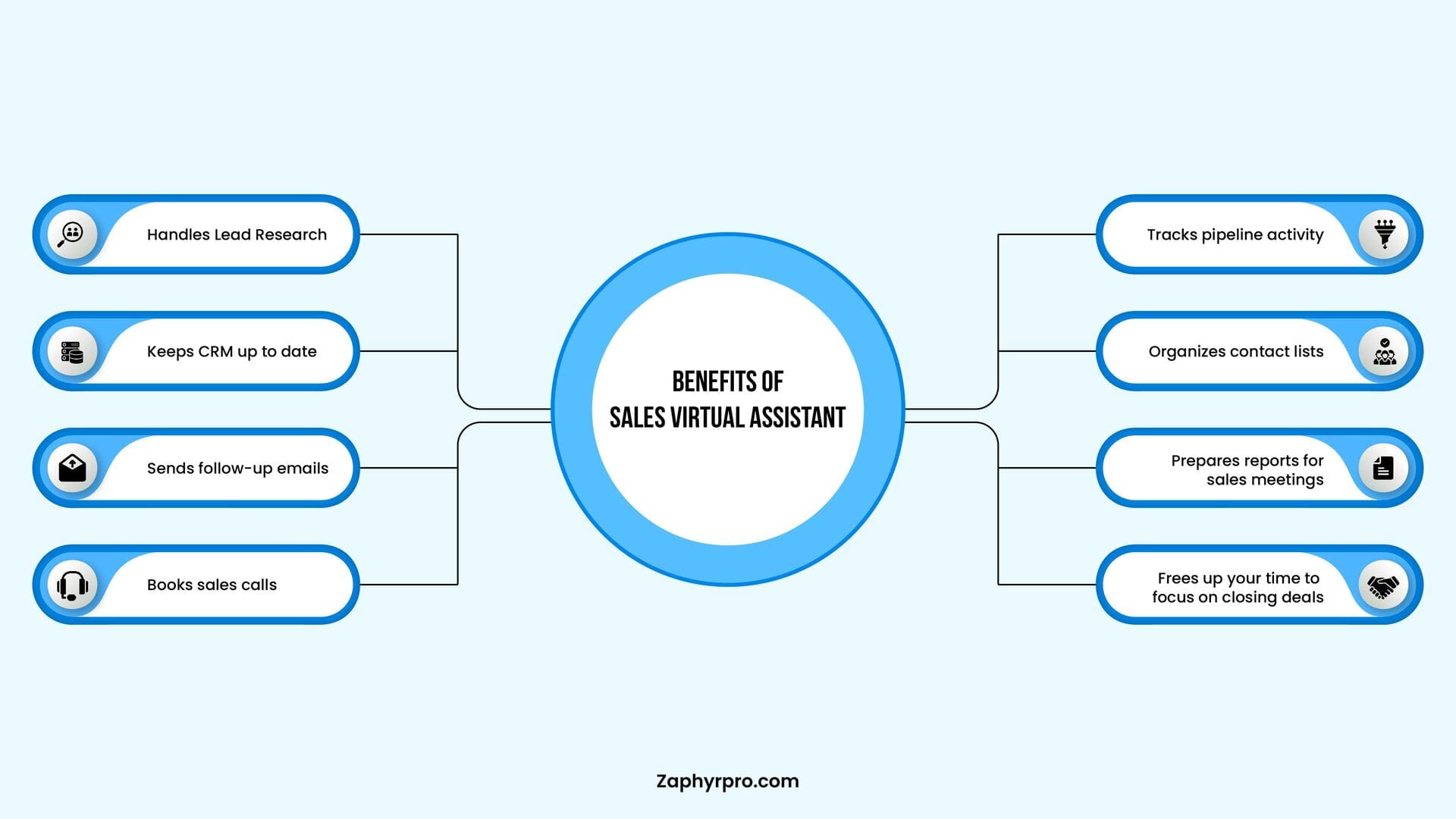
Which is better, a freelancer or a virtual assistant?
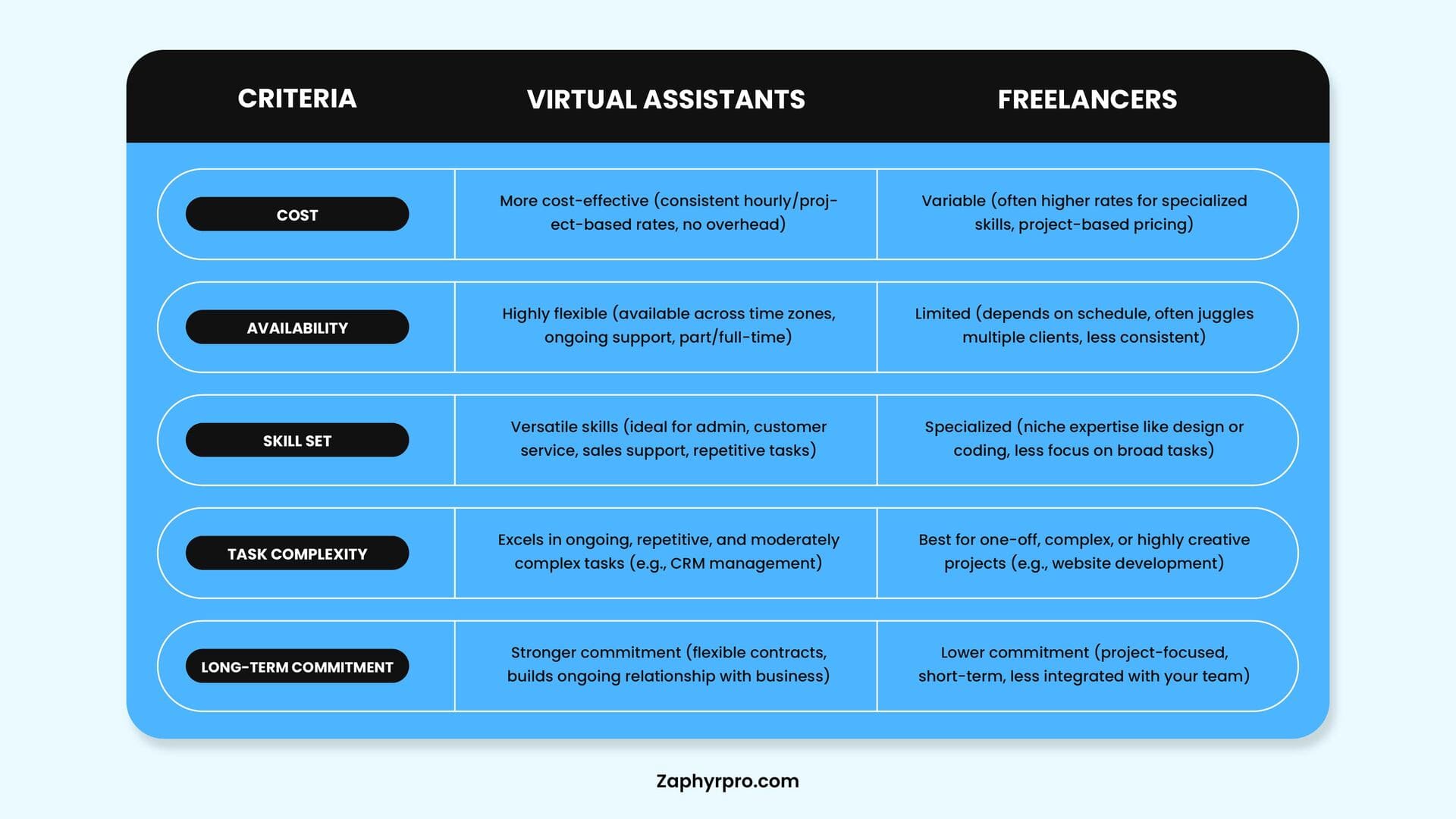
Given all of these points, you might be wondering: why choose a virtual sales assistant over a freelancer at all? Can’t you get the same specialized sales expertise from a freelancer who might have more experience in your specific industry?
You’d be surprised. While freelancers can offer deep expertise, you may find that the advantages of a virtual sales assistant far outweigh the appeal of specialized knowledge, especially when it comes to building a consistent, reliable sales process.
Here's why a virtual sales assistant typically works better for ongoing sales support:
- Consistency Matters More Than Specialization: Your sales process needs someone who shows up every day, understands your customers, and follows your specific procedures. A virtual sales assistant becomes part of your team and learns your business inside and out. Freelancers, while skilled, often juggle multiple clients and may not give your sales pipeline the dedicated attention it deserves.
- Sales is About Relationships, Not Just Skills: Building trust with prospects takes time and consistency. When the same virtual sales assistant handles your leads week after week, they develop a feel for your customers and can represent your brand authentically. With freelancers, you’re constantly starting over with new people who don’t know your business or your customers.
- Ongoing Support vs. Project Work: Sales support isn’t a one-time project – it’s an ongoing process that needs daily attention. Virtual sales assistants are built for this kind of long-term partnership, while freelancers typically work best for specific, short-term projects.
Still have questions about virtual sales support? We'd be happy to talk you through it!
How Much Does a Virtual Sales Assistant Cost?
Now that you understand why virtual sales assistants work better than freelancers for ongoing sales support, let’s talk numbers.
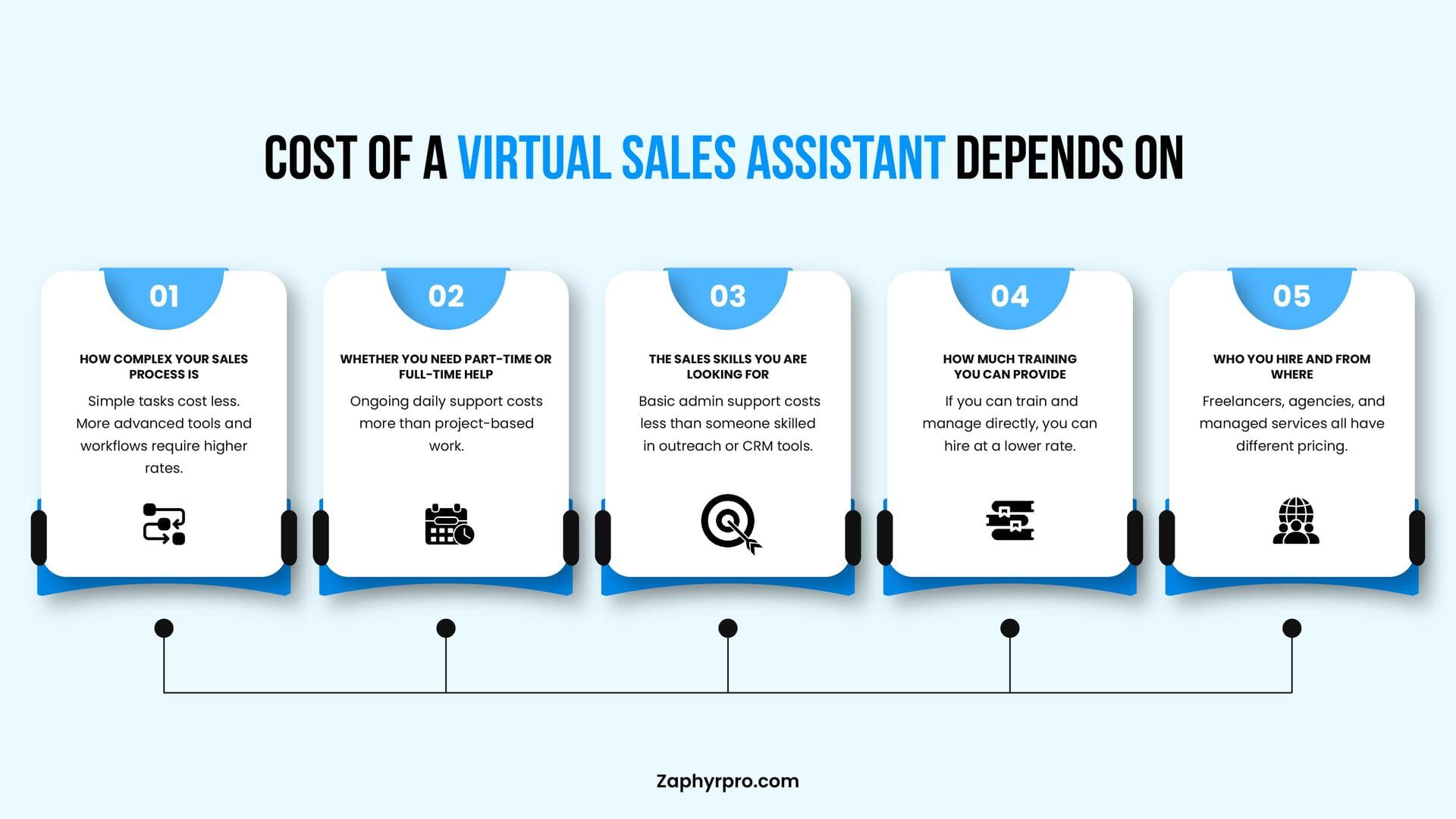
Understanding Virtual Sales Assistant Pricing
Most virtual sales assistant services use one of three pricing models:
Hourly Rates ($20-45/hour)
You pay for actual time worked. This works well if your sales volume fluctuates or you’re testing out virtual assistance. Rates vary based on the assistant’s experience and the complexity of tasks.
Monthly Packages ($800-2,500/month)
Fixed monthly fee for a set number of hours or specific deliverables. Most businesses prefer this because it’s predictable and often more cost-effective than hourly rates.
Performance-Based Pricing
Some services charge based on results – like per qualified lead generated or per meeting scheduled. This aligns costs with your sales outcomes but isn’t widely available.
What Affects Your Virtual Sales Assistant Cost?
Experience Level
- Entry-level assistants: $20-28/hour (basic CRM tasks, data entry, appointment scheduling)
- Experienced assistants: $30-40/hour (lead qualification, sales research, pipeline management)
- Senior sales support: $40-45/hour (complex sales processes, strategic support)
Geographic Location
- U.S.-based assistants: $35-45/hour
- English-speaking countries (Canada, Australia): $25-35/hour
- Offshore locations: $15-25/hour
Service Package
- Basic support: Just the assistant
- Standard service: Assistant + basic management
- Premium service: Assistant + dedicated account manager + backup support + training
Hidden Costs to Consider
Setup and Training Time: Most services include 2-4 hours of onboarding, but complex sales processes might need more. Factor in your time for initial training sessions.
Tools and Software: Your virtual assistant will need access to your CRM, email marketing platform, and other sales tools. Most businesses already have these, but additional user licenses might cost $20-100/month.
Quality Assurance: Premium services include ongoing quality monitoring. With lower-cost options, you might spend 2-3 hours per week reviewing work and providing feedback.
Is It Worth the Investment?
Here’s a simple way to think about ROI:
If your virtual sales assistant helps you close just one additional deal per month, they’ve likely paid for themselves.
When calculating virtual assistant ROI, start with your time. If you’re spending 15 hours a week on sales admin tasks instead of selling, and your time is worth $50/hour, that’s $750/week in opportunity cost – or $3,000/month. A virtual sales assistant costing $1,500/month could free up that time and actually save you money while increasing sales.
The question isn’t whether you can afford a virtual sales assistant – it’s whether you can afford not to have one.
How to Hire Virtual Sales Assistant
You have four main ways to hire a virtual sales representative. Each option has different costs, time commitments, and levels of support. Here’s what you need to know about each approach.
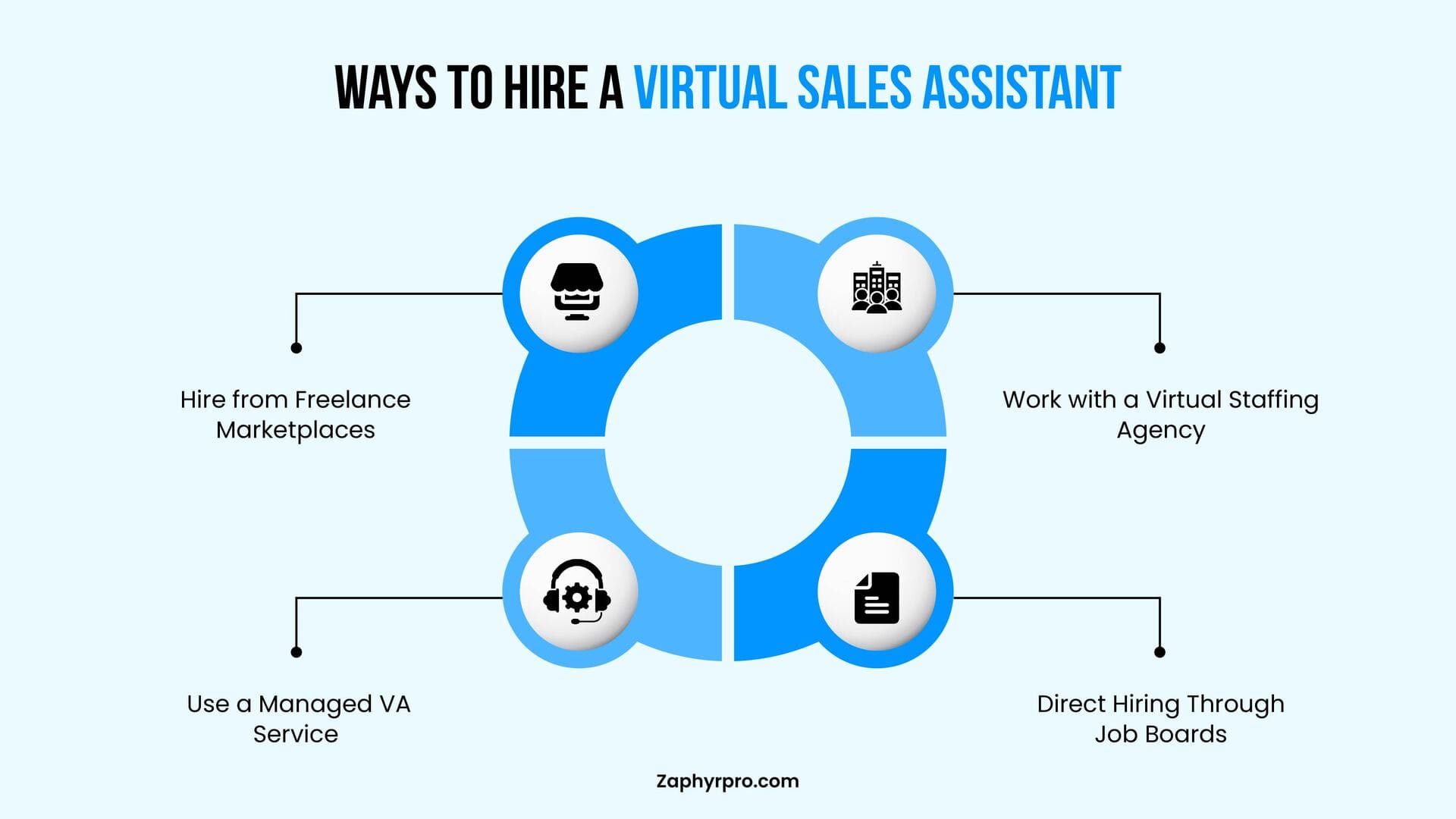
Option 1: Hire from Freelance Marketplaces
You post your job requirements, freelancers submit proposals, and you choose based on their profiles, rates, and previous work samples. Most platforms handle payments and provide basic dispute resolution.
Popular Platforms:
- Upwork – Largest marketplace with detailed profiles and work history
- Fiverr – Good for specific sales tasks and projects
- PeoplePerHour – Wide selection with competitive bidding
- 99designs – Professional freelancers with portfolio showcases
Best For: Businesses that want direct control over hiring and don’t mind managing the relationship themselves.
Option 2: Work with a Virtual Staffing Agency
VA agencies maintain teams of pre-screened virtual assistants. You tell them your requirements, they match you with suitable candidates from their roster, and you work directly with the assigned assistant.
Popular Sales-Focused Agencies:
- Time Etc – US and UK-based assistants with sales experience
- Belay – College-educated US virtual assistants
- Fancy Hands – On-demand task-based assistance
- MyTasker – Philippines-based team with sales specialization
The Process:
- Contact the agency with your needs
- They recommend 2-3 candidates from their team
- You interview or trial the candidates
- Start working with your chosen assistant
Best For: Businesses wanting pre-vetted candidates but still preferring to manage the working relationship directly.
Option 3: Use a Managed VA Service
These companies provide full virtual staffing services, handling everything from recruitment and training to management and quality control. Your virtual assistant is their employee, and you get an account manager who ensures everything runs smoothly.
Leading Managed Services:
- Zaphyre – Specialized B2B lead generation and sales support services
- Delegate Solutions – Full-service with US-based management
- Time Doctor – Comprehensive virtual assistant solutions
- Virtual Staff Finder – Specializes in Philippines-based assistants
The Complete Process:
- Consultation call to understand your needs
- They assign a trained assistant and account manager
- Quick onboarding with your systems and processes
- Ongoing management and performance monitoring
Best For: Busy business owners who want results without managing another person.
Option 4: Direct Hiring Through Job Boards
Post your job description, receive applications directly, screen and interview candidates yourself, then hire your preferred choice as an independent contractor or employee.
Where to Post Jobs:
- Indeed – Largest job board with remote work filters
- LinkedIn – Professional network with advanced search options
- Remote.co – Exclusively remote job postings
- FlexJobs – Curated remote and flexible positions
- We Work Remotely – Popular remote-first job board
Best For: Companies wanting full control over the hiring process and direct employment relationships.
Ready to Scale Your Sales Without the Hiring Hassle?
If you’ve reached the point where your sales growth is limited by time rather than opportunity, a virtual sales assistant can be the game-changer you need.
The challenge isn’t finding a virtual sales assistant – with thousands of options available, it’s finding the right one who understands your sales process and can deliver results from day one.
Whether you choose to hire independently or work with a managed service, the most important thing is getting started. Your competitors are already using virtual sales support to outpace businesses that try to handle everything in-house.
Want to see how a dedicated sales support team could transform your revenue? We’d love to show you what’s possible when you have the right virtual sales assistant handling your pipeline.
Contact us today to find out what kind of support would move the needle for your team.
Frequently Asked Questions
A virtual sales assistant is a remote professional who supports your sales team by handling tasks like lead research, CRM updates, follow-up emails, scheduling, and reporting. They free up your sales reps so they can focus on closing deals instead of admin work.
While general virtual assistants handle a mix of admin tasks and executive assistants focus on scheduling and personal support, a virtual sales assistant works specifically within your sales process. Their tasks are tied to pipeline management, prospect outreach, and keeping your CRM organized.
Yes. A virtual sales assistant can save small businesses time and money by taking over sales admin work. This helps business owners and small teams focus on revenue-generating activities. It’s one of the easiest ways to scale without hiring full-time in-house staff.
Virtual sales assistant rates typically range from $15 to $45 per hour, depending on experience, location, and the complexity of tasks. Monthly packages range from $800 to $2,500. Managed services may charge more but include training, support, and backup coverage.
You can hire a virtual sales assistant from freelance platforms like Upwork, staffing agencies, managed VA services like Zaphyre, or by posting on remote job boards like LinkedIn and We Work Remotely. Each has different benefits depending on how hands-on you want to be.



